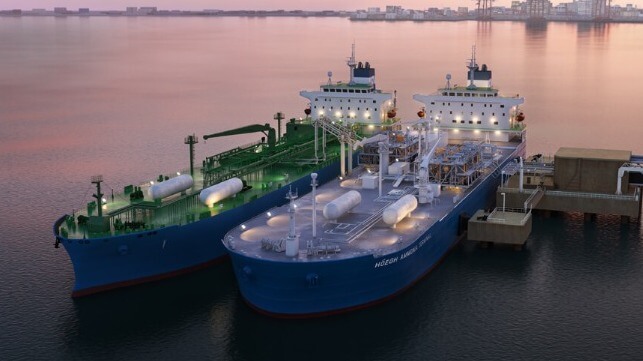Project Seeks to Extract Hydrogen from Ammonia on Floating Terminal

A project that seeks to develop a system to convert ammonia to hydrogen that could be installed onboard a floating terminal is receiving €5.9 million ($6.5 million) in funding from the Norwegian government. The project will be led by Höegh LNG and Wärtsilä with the companies terming it a solution for using ammonia as a hydrogen carrier for the energy market. If successful, the concept would pave the way for hydrogen energy to be developed in a similar fashion to the current offshore LNG terminals.
Hydrogen is difficult to store and transport due to its low volumetric energy density and potential for large vaporization losses. Ammonia is significantly better suited than hydrogen for transport and acting as a carrier since it can be stored in liquid form at moderate pressures and temperatures. The objective of the project is to enable ammonia to be converted back to hydrogen at the receiving destination.
“This important project is a natural extension of the investments and efforts made by Wärtsilä to accelerate the use of decarbonized energy,” said Walter Reggente, Vice President of Wärtsilä Gas Solutions. “Hydrogen will play a considerable role in future renewable fuel consumption, and there is a clear need for the development of ammonia as a storage and transportation carrier for hydrogen.”
As a carbon-neutral renewable energy carrier, ‘green’ ammonia is produced from hydrogen, via electrolysis of water, and nitrogen from the air. Green ammonia acts as a liquid battery with a high energy density compared to alternative solutions for the storage and transport of renewable power. The infrastructure for the large-scale transport of ammonia at sea already exists via a fleet of gas tankers that are already capable of transporting ammonia
The project aims to develop a system to convert ammonia back to hydrogen, which will then be installed onboard a Höegh LNG vessel. This will provide a floating receiving terminal capable of being relocated as needed, requiring minimal use of coastal land and a solution resulting in lower overall cost, improved safety, and competitive hydrogen prices.

that matters most
Get the latest maritime news delivered to your inbox daily.
“As a world-leading provider of fast-track floating LNG terminals, we have technology and competence essential to developing a strong clean energy value chain,” said Erik Nyheim, CEO and President of Höegh LNG.
The grant coming from the Norwegian Government’s green platform program will provide approximately half of the total budget. Additional partners in the project include the Institute for Energy Technology (IFE), the University of South-East Norway, Sustainable Energy, and BASF SE.
